Building an app for your business isn’t exactly a walk in the park. But you know what’s even tougher?
Raising funds for your app idea. After all, 38% of startups fail because they run out of cash or fail to raise new capital.
In this blog, I’ll help you overcome this challenge, telling you the key sources of app funding and the different stages of the process.
Plus, I’ll also reveal an underused hack that can help you secure it without investing in a fully developed app.
Let’s dive in 👇
What is app funding?
App funding is the financial support provided to app developers and businesses to develop, launch and scale their apps. App funding helps you turn your mobile app idea into a fully functional product by covering app development costs, operational costs and marketing costs.
From April 2022 to 2024, there have been 8780 funding rounds globally, raising more than $5.5 Bn. This is on the back of ever-increasing consumer spending on mobile apps, which is more than $67.5 Bn.
Although there are reports of a global recession, good app ideas are getting funded. All you need to do is look for a viable source of funding.
How much money do you need to create an app?
While apps can be free or available at a very low cost, it’s generally accepted that the average app development cost ranges between $5,000-$500,000.
The price range is so wide because three key factors have a huge influence on your cost estimate, including:
- The type of platform you’re building on; this could be Android, iOS or a Web App
- The app complexity; depending on the roles you want your app to perform, you may or may not need custom app features
- The development route you choose; you can create an app yourself, hire a freelancer or work with an app builder to build it for you
Lower-cost apps are typically associated with shorter development phases and can be ready in a matter of weeks. By contrast, more sophisticated apps can take several months or even years to create.
Other than development, you need money for marketing your app and maintaining it.
Rather than asking how much money you need to build an app, you should work backwards, asking what features and functionalities your app needs first.
7 different sources of app funding
Creating an app from scratch isn’t a walk in the park. Luckily, there are many ways to raise funds for your app to make it easier 👇
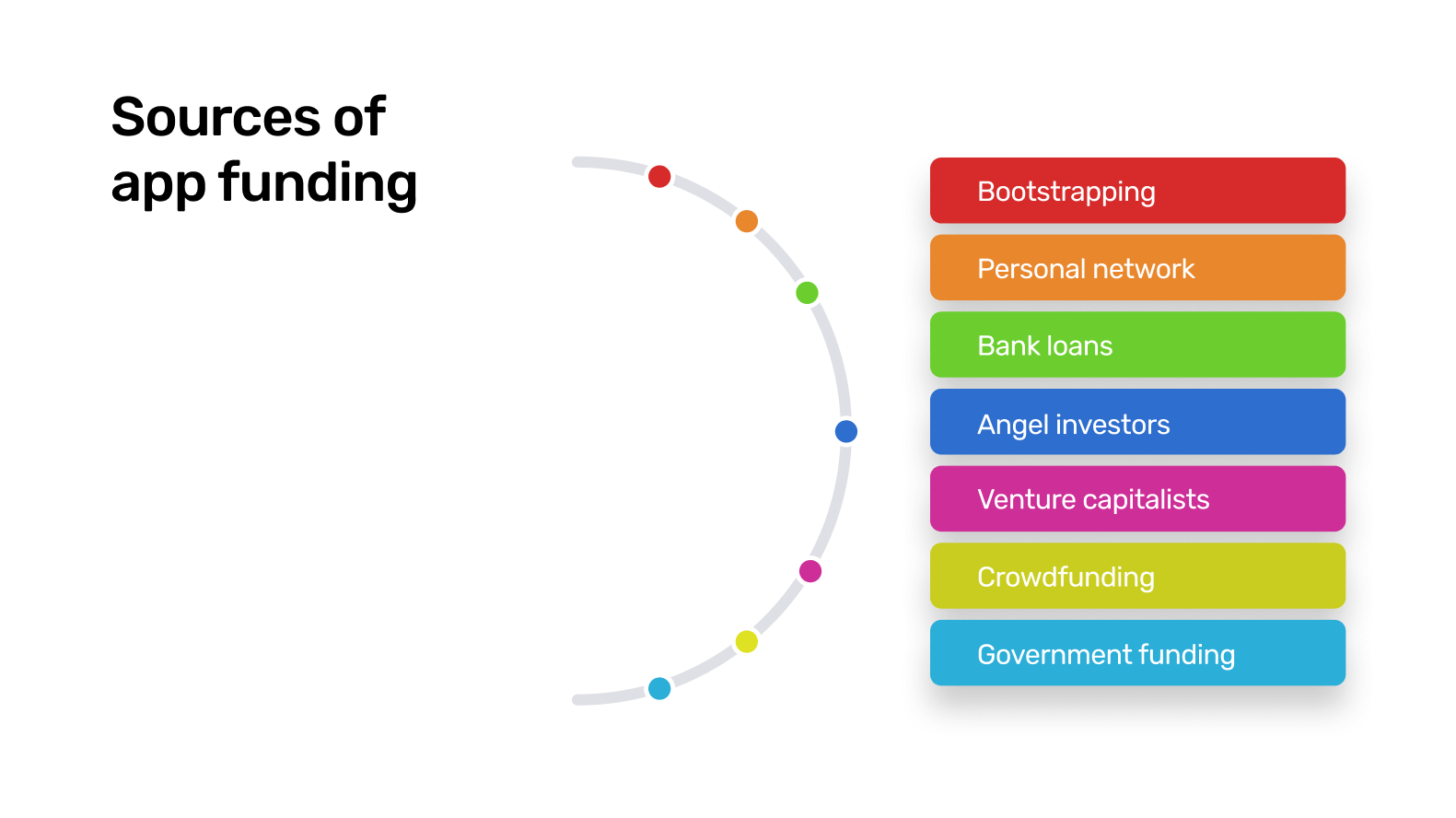
1 - Bootstrapping
Bootstrapping is the DIY approach to app funding where you put your own money into your app.
This makes it one of the most rewarding ways to develop your app, as you don’t have to sell equity in your dream project.
So, if you’re an entrepreneur that can cover app development costs, then bootstrapping is the best option.
But if you’re a little short, then family and friends can also help you out as well as angel investors and crowdfunding campaigns.
2 - Personal network
Your family and friends can be fantastic sources of app funding. This is because they already know and trust you, plus they’re already familiar with your work ethic and passion for the project.
You’ll still need a pitch deck and some visuals to get them on the same page, but convincing them is much easier than asking for funds from banks.
However, raising funds from family and friends can be risky on both financial and personal fronts. If things go haywire, you could put your app and personal relationships in jeopardy.
3 - Bank loans
A bank loan is a viable option for app funding, but one that may cause more pain than gain.
For example, it may be difficult for you to get a bank loan in the first place, with many startups failing to meet the minimum criteria.
And even if your application is accepted, securing the loan involves a hefty amount of paperwork, including credit checks that may extend the length of your app development project.
Plus, you have to start paying back your loan even if your app hasn’t launched or is gaining revenue.
Bank loans are viable only if you have a B2B business where you have a committed client. If not, it could be dangerous as you as a founder will be liable to pay back.
4 - Angel investors
If you can’t get all the finances you need from your own funds and friends and family, the next thing on your list should be to look for angel investors to get your app funded.
Angel investors are individuals who invest their money in early stage startups for some equity in the business. But more than just money, they bring expertise and contacts, which can help your app business succeed.
In 2021 alone, angel investors put an average of $346,000 into startups through convertible debt and equity.
Angel investors typically offer very flexible terms when compared to bank loans or venture capitalists and are even willing to negotiate equity stakes.
In contrast to banks, if your app idea tanks, you’re only responsible for returning the remaining funds to angel investors.
Today, there are many places to find angel investors, like AngelList, Gust and Angel Investment Network.
5 - Venture capitalists
Where angel investors invest in the early stages of your app’s development, venture capitalists rarely do. Typically, they fund high-performing businesses with strong balance sheets and revenue numbers in exchange for equity.
However, VCs can come on board if your idea meets their investment criteria and you have the team to achieve it.
As an app owner, you can think of securing funding from VCs as the ultimate dream, as it lends huge credibility to your app and validates its market potential.
Funding from VCs provides a substantial capital injection, which can help you scale your app quickly and compete effectively in the market.
6 - Crowdfunding
Got a killer app idea that the masses will love? Then you can try crowdfunding to get your app funded, as it’s getting very popular because of platforms like Seedrs, Crowdcube, GoFundMe and Kickstarter.
These platforms put your startup ideas in front of millions of people who can back your project. You can also find Angels and VCs who invest via these platforms.
On the platforms, you can pitch your business idea and set up your funding targets so that your backers can invest money for small equity in your project.
Other than the money, crowdfunding also generates buzz for your app, attracting attention from potential users in the process.
Many apps have been successfully crowdfunded through such platforms. Monzo, Revolut and Exploding Kittens are many of the successful projects funded through crowdfunding.
7 - Government funding and grants
Depending on the country you live in, you can look out for government funding in the form of subsidies and grants. Today, more and more governments around the globe are creating online platforms and trying to streamline the funding process.
For instance, in India, the government has started Startup India, where they support new startups with financial, infrastructural and regulatory support. Similarly, the government of the UK has a Find a Grant service that allows you to search for government grants.
Generally, you don’t have to pay back the government grant. However, you’ll have to abide by the grant’s terms and conditions, which can vary from country to country.
Securing government funding can serve as a stamp of approval for your business and build the credibility of your app idea, making it more attractive to other investors.
Want to start your app project with us?
Book a demoSpeak with one of our product experts today.
By proceeding you agree to Builder.ai’s privacy policy and terms and conditions

Stages of app funding
There are many stages of app funding that follow a progression from early stage to later-stage financing rounds.
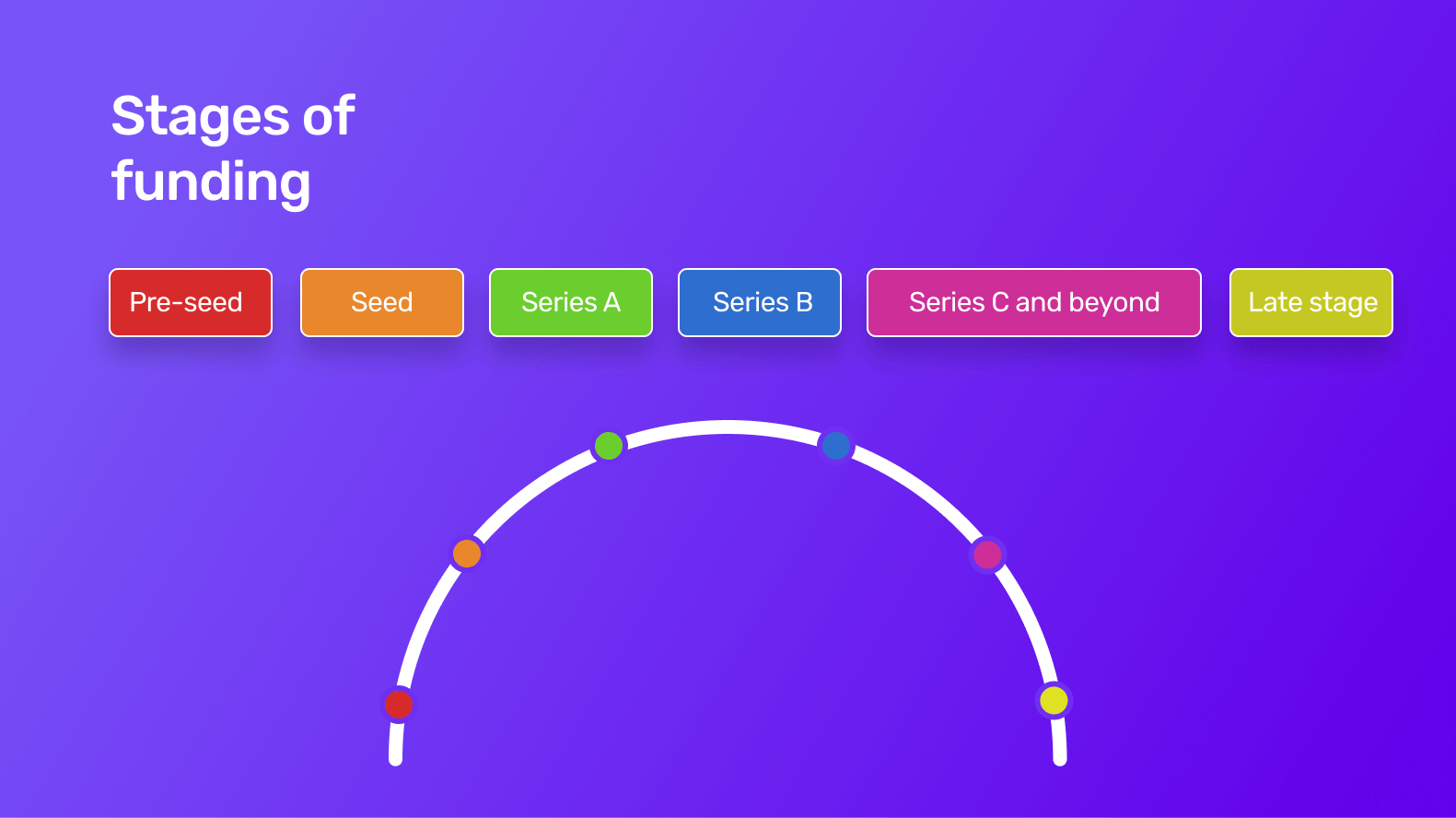
1 - Pre-seed
Pre-seed is the stage where your app idea is being developed and validated. Here, you’ll create an app prototype or better yet, build a minimum viable product (MVP) to gain early traction.
Additionally, the pre-seed stage is when you’ll look out for team members or establish contracts with partners like:
- Co-founder agreements
- Supplier and vendor agreements
- Licensing agreements
- Intellectual property rights
And all of this costs money.
When it comes to funding, you’ll either have to use your own funds or you can contact angel investors or look for pre-seed funds.
At this stage, it’s the hardest to raise app funding, as you don’t have anything to show but an idea. However, if successful, you can expect to raise anything from $100,000 to $1 million. Nonetheless, the chances are you’ll have to fund your app idea mostly out of your own pocket.
To give yourself a better chance of winning over investors when pitching, you can create custom app prototypes before you invest in the development of your idea. See “Make a great pitch” below for more.
2 - Seed
During the seed stage, you’re either on the verge of launching your app or have just introduced it to the market and are beginning to gain early traction.
If you haven’t already, then, at this stage, you should go all out and look for funds from angel investors, government grants or other startup funding sources.
Angel investors are likely to invest in the seed stage, because you’ve already done your market research, built a strong app business plan and have built an MVP.
Funds at this stage typically go towards app development costs, launching and marketing the app.
In this round, you can expect to raise $0.5-10 million for 10-25% of the equity.
3 - Series A
If you’ve made it this far, that means you’ve already built a fully functional app that has been on the market for a while. At this stage, your app should show month-on-month growth, decent conversion metrics and generate revenue.
Series A can be thought of as the first significant round of raising funds.
Series A funding is typically for the stage when you’re focusing on the growth of your business and have a clear plan for how you're going to scale it. You should aim to expand your user base or revenue while keeping your balance sheets healthy.
If your app has gained traction and all your key app metrics are soaring, then you can go after venture capital firms, which means your app is well and truly off the ground.
In this round, you can raise anything between $5 million and $50 million for 20-50% of the equity in your business.
4 - Series B, C, and beyond
After Series A, it's all about scaling your business, which requires even bigger investments.
If you’ve reached Series B and beyond, this means you’re already kicking and the chances of your app being successful are pretty high.
Because your app has already made it, it's not hard for your app to raise funding. You can easily raise upwards of $50 million for 20-50% of equity.
5 - Late-stage funding
This is the funding round that established businesses that have achieved market dominance participate in.
This is the stage where you prepare to launch your initial public offer (IPO) and aim for rapid expansion. There’s no real limit to how much you can raise at this stage.
Funding amount | % of equity to be given | Sources | |
Pre-seed | $100,000 - $2 million | 0 - 20% | Bootstrap, Personal network, Angels |
Seed | $1 million - $10 million | 10 - 25% | Angels, Crowdfunding, Government grants |
Series A | $10 million - $25 million | 20 - 50% | Venture capitalists, Bank loans |
Series B, C and beyond | $25 million+ | 20 - 50% | VCs, Equity firms |
*Disclaimer— The figures stated above are estimated values and are not rigid. The amount of money you raise depends on the valuation of your startup, the industry you work in, operating regions, founding team and tractions.
How to increase your chances of securing app funding
Your journey from securing a pre-seed to an IPO will never be straightforward. However, there are things you can do to increase your chances of securing app funding and speed up your success 👇
1 - Create a foolproof pitch deck
During your pre-seed and seed rounds, your pitch deck is your ticket to getting investors on board.
A strong pitch deck shows your investors that you understand the market, you've got a killer strategy to disrupt it and a team that’s ready to get its hands dirty.
To make sure that you cover all your investors’ questions, your pitch deck should include:
- Team -people that’ll tackle the challenge head on
- Problem -address the pain point with clarity and precision
- Solution -offer innovative and effective solutions that directly address the identified problem
- Competitive analysis - identify your direct and indirect competitors and uncover your competitive advantage
- USP - emphasise your unique selling point that makes you stand out from market
- Go-to-market (G2M) strategy -outline clear plan to acquire customers and capture market share
- Monetization strategy - describe how your app will make money, whether through in-app purchases, in-app advertising or something else
- Traction -present evidence of market validation and user adoption of your idea
- Raising amount - clearly state the funding amount you look for and the proposed deal terms
- Usage -tell where and how you’ll use the raised amount, like growth and expansion
2 - Enlist the right investor and investment options
Investments aren’t one-size-fits-all. Finding the right investor for your business is equally important.
After all, choosing the wrong type of investment and having a bad fit for an investor can lead to a lack of support, conflicting goals and unstable funds.
All the investors I talked about earlier have the funds to help you, but they should be approached at different stages in your product's development. For instance, while seed and angel investors are ideal if you’re just getting started and need assistance finding a product-market match, VCs are the best choice when you want to scale your business.
It’s also important to think of investors as partners. That means establishing strong bonds with them and ensuring that they’re bringing support and expertise as well as a financial injection.
3 - You don’t have to have all the answers, but you should have most of them
What’s also important is to be able to answer all kinds of questions prospective investors might have for you. To ensure you don’t falter at this hurdle, ask questions about the following to yourself:
- What is the problem statement and the solution you offer?
- Is the answer to the question above consistent with your audience’s needs?
- What features would make your intended user’s journey seamless?
- What is your brand story?
At this point, networking with as many prospective customers as you can is advisable. They may be able to provide you with views into the ground-level issues they’re experiencing, which will eventually assist you in gaining clarification on all of the above questions.
You can search for prospective customers in pre-existing groups on Facebook, Instagram, Discord, Clubhouse, local events and online community sites, among other places.
4 - Make a great pitch
There’s no better way to leave a lasting impression on investors than by making a compelling pitch.
Think of delivering a pitch as your only chance to tell the world why your app is worth investing in. It simply persuades investors to open their wallets and come on board.
Only by mastering the art of pitching can you effectively communicate your app's story and secure the funding needed to bring it to market.
But before you do that, you need to find and list down the right investors to back you! And the best way to find them is by networking. Here are some places where you can find investors to connect with:
- Pitch events and hackathons
- Incubators and accelerators
- Conferences and networking events
- Angel investor networks
- Crowdfunding platforms
- Social media and community platforms
- Mutual contacts
Once you know who you’re pitching to and you’ve secured a meeting, you need to pull out on the stops to convince them to invest. This is where app prototypes come in.
Instead of being an abstract concept, app prototypes bring your pitch to life, allowing investors to interact with your app and provide feedback on it.
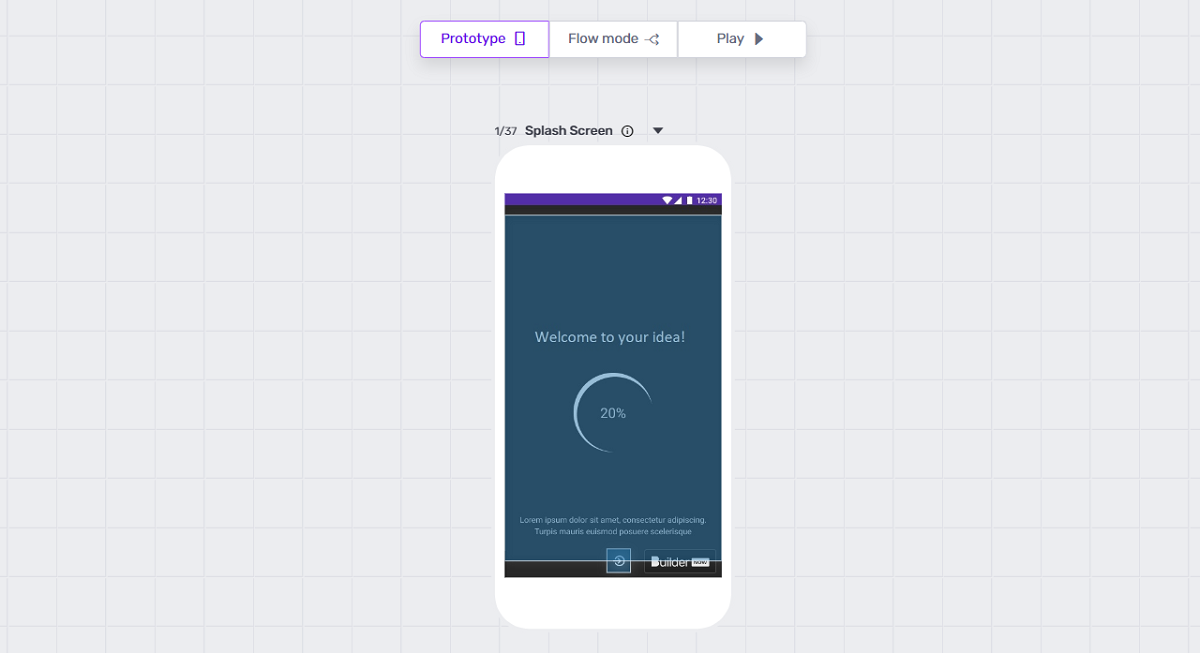
As an example, here’s what an individual app screen looks like in an app prototype 👆
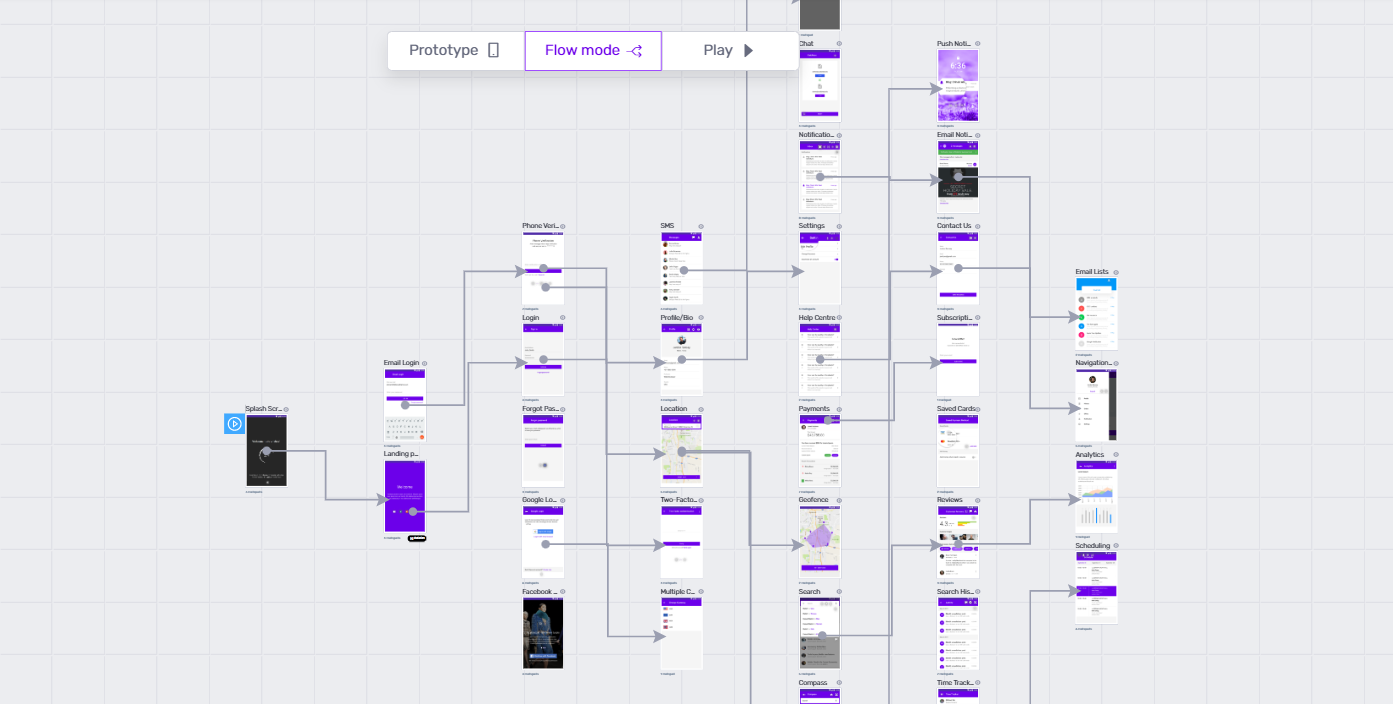
And here’s what a full flow, including all your app screens, looks like. 👆This allows you to:
- Prove your app concept- investors can visualise your idea and see how it delivers on your objectives
- Get clarity- having you, your team and investors on the same page about the exact things you want to be included in your app smoothens the development process
- Save time and money- detect errors and make changes early in the app design process, beforedevelopers start working on it
Especially for those who have limited funds from bootstrapping and friends and family, app prototypes are a proven and cost-effective hack that help you to secure funding from major investors.
Conclusion
App funding is the key to transforming your app idea into a legitimate business.
And while securing it isn’t a walk in the park, there are a range of strategies available to you that can twist investors’ arms.
The most persuasive one you can use is to create a custom app prototype because it offers a taster of what you can offer to the market without burning through your personal funds.
Create your app prototype with our free tool, Builder Now today or hit the banner below to book a demo 👇
Want to start your app project with us?
Book a demoSpeak with one of our product experts today.
By proceeding you agree to Builder.ai’s privacy policy and terms and conditions


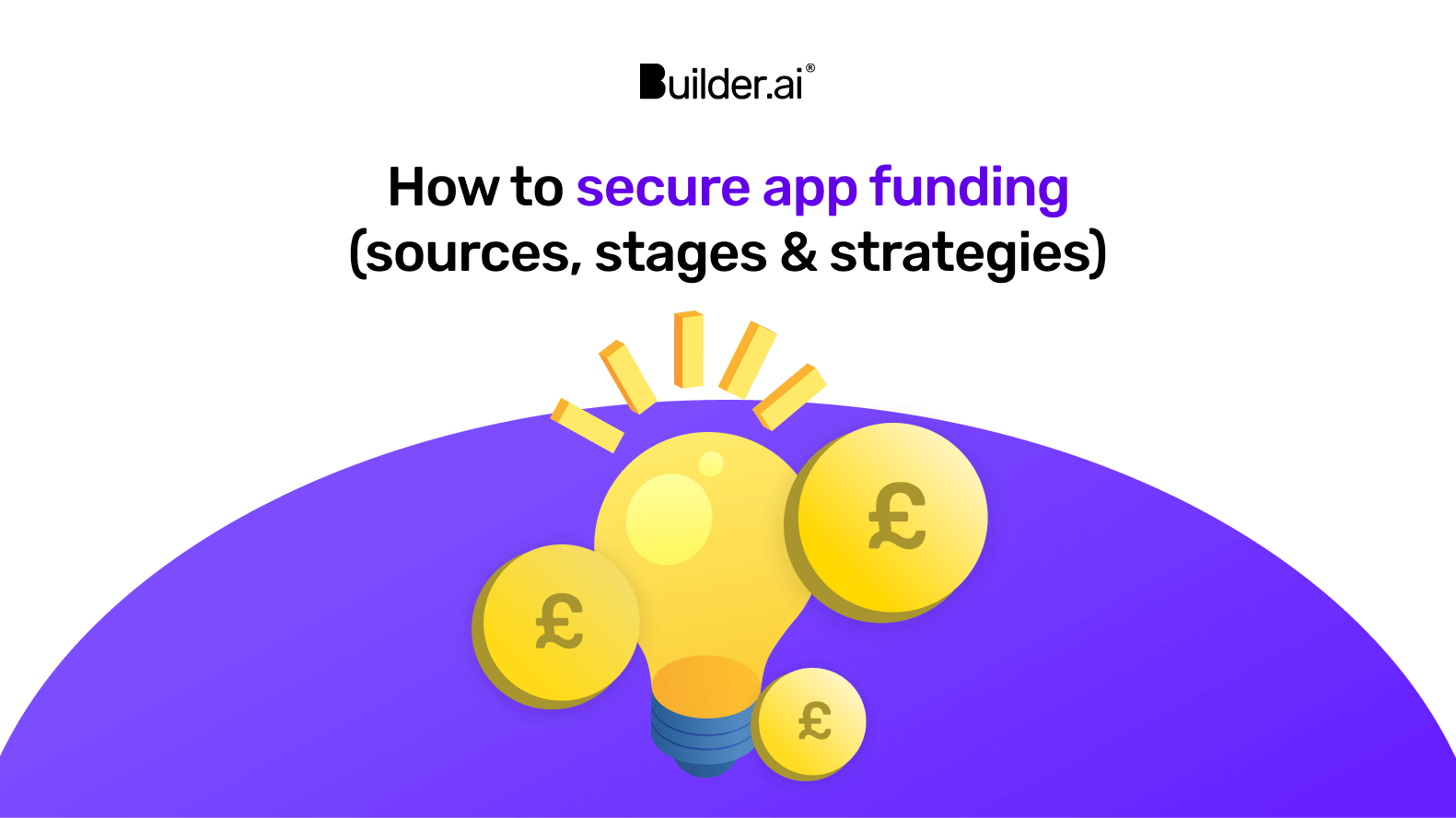



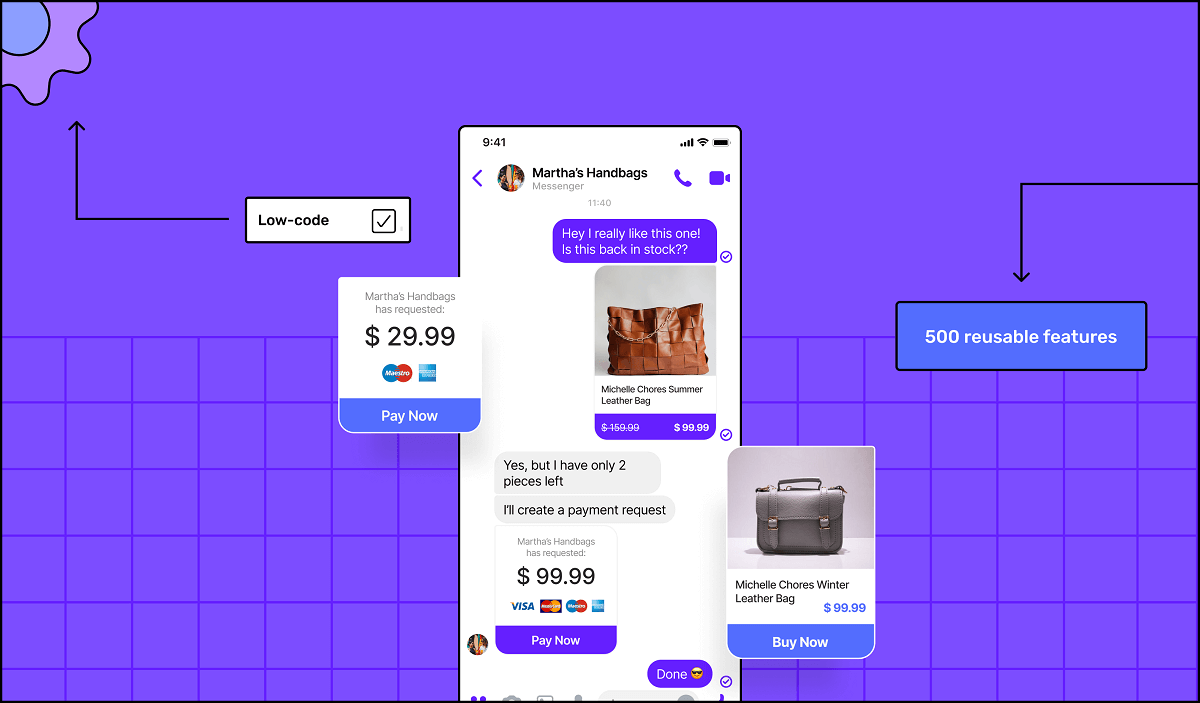







 Facebook
Facebook X
X LinkedIn
LinkedIn YouTube
YouTube Instagram
Instagram RSS
RSS


